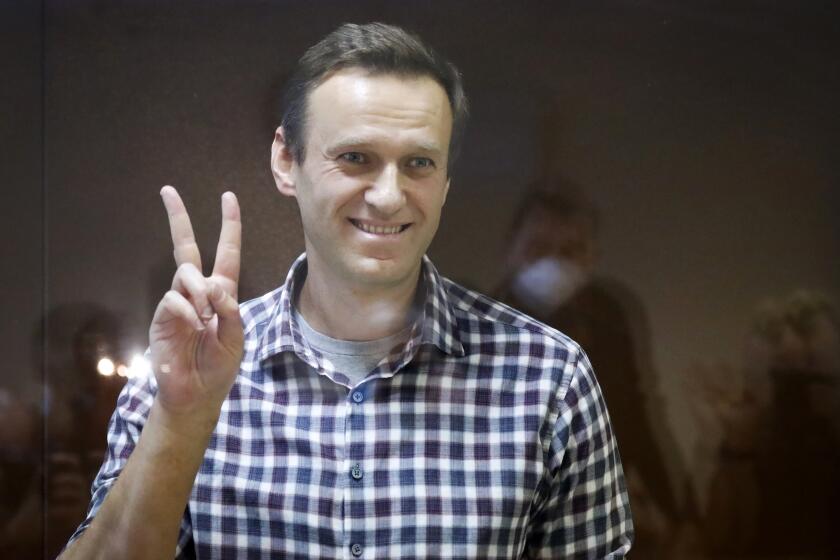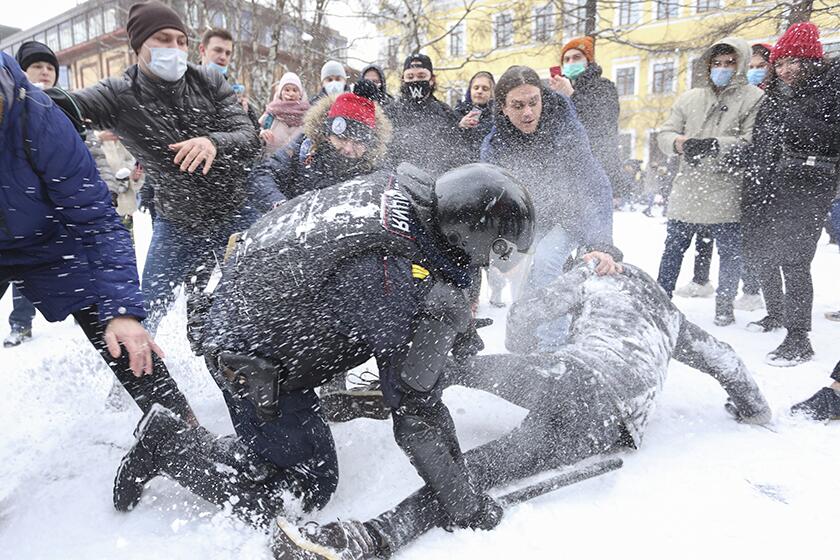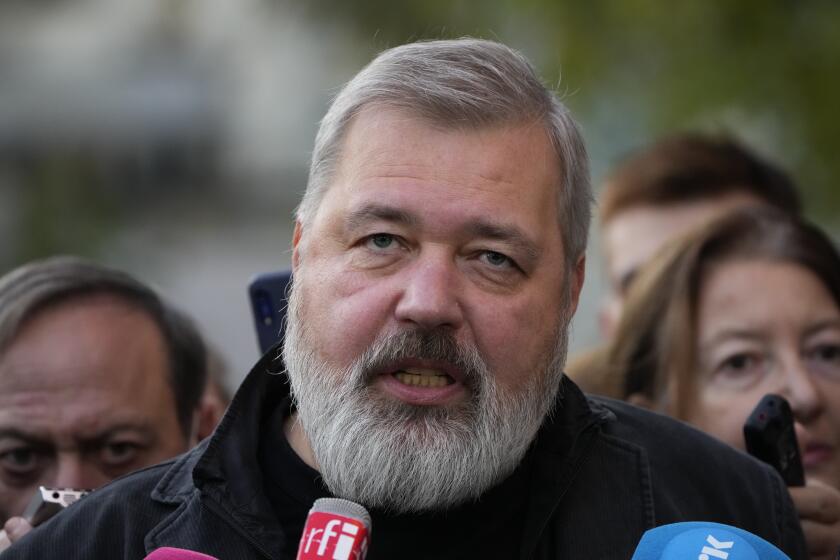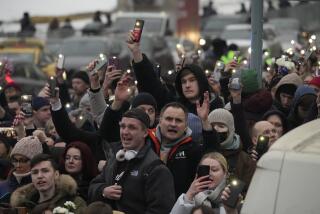Jailed Russian opposition leader Alexei Navalny wins EU’s top human rights prize
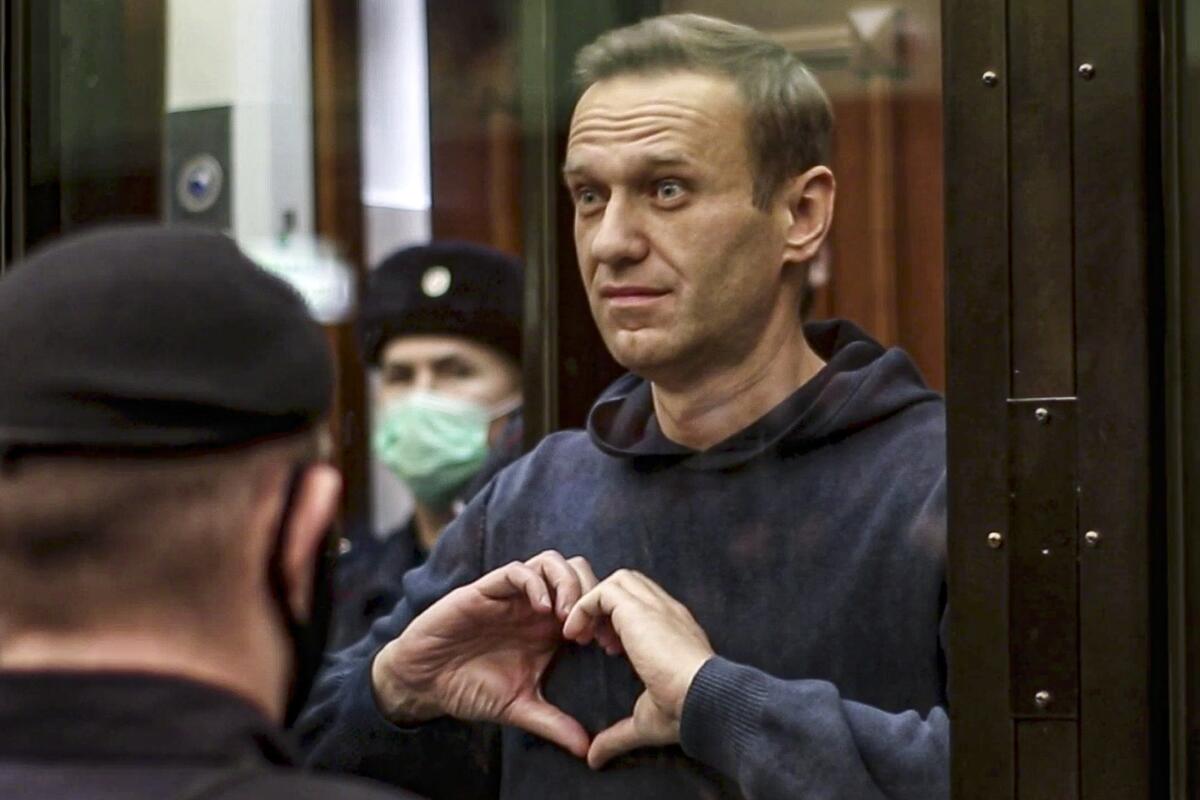
- Share via
BRUSSELS — Imprisoned Russian opposition leader Alexei Navalny, who narrowly survived a poisoning that he blames on the Kremlin, was awarded the European Union’s top human rights prize Wednesday in a clear slap at President Vladimir Putin.
In awarding the Sakharov Prize to Navalny, the European Parliament praised his “immense personal bravery.” The 45-year-old activist fell ill from a nerve-agent poisoning last year and recuperated in Germany, then was promptly arrested upon his return to Moscow and later imprisoned.
“He has campaigned consistently against the corruption of Vladimir Putin’s regime, and through his social media accounts and political campaigns, Navalny has helped expose abuses and mobilize the support of millions of people across Russia. For this, he was poisoned and thrown in jail,” David Sassoli, the president of the European Parliamient, said in a statement.
Sassoli called for the immediate release of Navalny, who is Putin’s biggest domestic foe.
There was no immediate reaction to the award from the Kremlin, which denies any involvement in Navalny’s poisoning.
Following his imprisonment, authorities unleashed a sweeping crackdown on his groups and associates. In June, a court outlawed Navalny’s Foundation for Fighting Corruption and a network of his regional offices as extremist organizations, a verdict that carries long prison terms for those associated with them. Several of Navalny’s top allies have fled Russia, and courts have given suspended sentences to and restricted the travel of some others who remained.
Imprisoned Russian opposition leader Alexei Navalny has urged global leaders to target corruption and the tycoons close to President Vladimir Putin.
A Russian Interior Ministry “wanted” notice said Wednesday that it was searching for Lyubov Sobol, a top Navalny associate who received a suspended sentence and faced travel restrictions. Her whereabouts are unknown, but Russian news reports suggested that she has left the country.
The EU recognition of Navalny will further sour relations between the 27-nation bloc and Russia. These ties have been on the decline for years, especially following Moscow’s 2014 annexation of Ukraine’s Crimean Peninsula and its support for a separatist insurgency in eastern Ukraine.
The impact reverberated beyond the EU as well.
Days after Russia suspended its mission at NATO and ordered the closure of the alliance’s office in Moscow in retaliation for NATO’s expulsion of Russian diplomats, the organization’s chief said he embraced the news.
Thousands of Russians continue to protest the arrest of Alexei Navalny and their country’s increasingly authoritarian rule.
“I welcome the fact that a strong voice ... in Russia has been awarded this prize,” NATO Secretary General Jens Stoltenberg said, adding that the prize also was a call for “his unconditional release from prison” and to have an international investigation into it.
Stoltenberg recalled that NATO considered the treatment of Navalny as part of a “pattern where we see that Russia has become more oppressive at home and more aggressive abroad.”
Russia’s treatment of Navalny has only exacerbated matters. The EU has called for his immediate and unconditional release in what it sees as a politically motivated imprisonment and has said it holds Moscow responsible for his health.
The EU imposed sanctions last year on six senior Russian officials for their alleged involvement in the poisoning of Navalny. Amid the standoff between Brussels and Moscow, the move by European lawmakers to award Navalny the prize has returned the issue to the heart of the political debate.
As a new Nobel Peace Prize laureate, Russian newspaper editor Dmitry Muratov has downplayed the buzz around his name.
“It is an important signal, also to the Kremlin, that the EU will not give in to pressure and blackmail or be fooled by empty promises,” said Sergey Lagodinsky, a German member of the European Parliament.
Navalny’s top associate, Leonid Volkov, said the prize showed that hundreds of lawmakers from different countries and parties agreed that the fight against corruption was an issue for all of Europe and that Navalny was “political prisoner No. 1 in the world and Putin’s personal captive.”
“Europe understands that we are fighting to make Russia a normal European country, which it will become, and supports it,” he said in a post on Facebook.
Ruslan Shaveddinov, another member of Navalny’s team, told the Associated Press that “Russian authorities may want this to be forgotten as soon as possible, but we see that European politicians believe that this issue is important and send quite a clear message that no one forgot and that they demand Alexei Navalny’s release.”
News Alerts
Get breaking news, investigations, analysis and more signature journalism from the Los Angeles Times in your inbox.
You may occasionally receive promotional content from the Los Angeles Times.
The 50,000-euro ($58,200) prize will be presented at the Dec. 15 session of the European Parliament in Strasbourg, France.
The EU award, named for Soviet dissident Andrei Sakharov, was created in 1988 to honor individuals or groups who defend human rights and fundamental freedoms. Sakharov, a Nobel Peace Prize laureate, died in 1989.
It was the second straight year it has gone to those challenging authoritarian leaders in Europe. Last year, it went to the Belarus opposition movement and its leader, Sviatlana Tsikhanouskaya, for their challenge to President Alexander Lukashenko’s rule following a widely disputed election in 2020.
More to Read
Sign up for Essential California
The most important California stories and recommendations in your inbox every morning.
You may occasionally receive promotional content from the Los Angeles Times.
